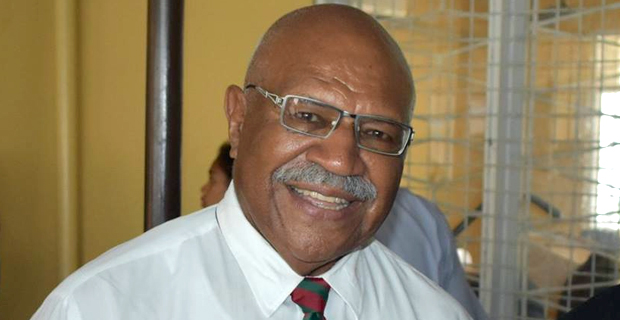Updated: 8:00am – Here in Fiji, depending on the context, we can all be Fijians when we are overseas, or when we are representing Fiji, but locally for ease of identification of who we are, we can refer to each other as native or indigenous Fijians, Indo‑Fijians, Chinese‑Fijians, European or part‑European Fijians, and Banabans and Rotumans.
Those are the words of SODELPA Leader Sitiveni Rabuka as he told law students at the University of Fiji that he has reservations about the common name ‘Fijian’ for everyone in the country.
Rabuka says for an indigenous iTaukei, to be called a “Fijian” means much more than being a citizen of Fiji. He says it means being registered in the iTaukei Vola ni Kawa Bula (VKB) as a member of a customary landowning Mataqali.
He says it is for this reason, that it has been very hard for many iTaukei to understand the Bainimarama government’s rationale for unilaterally appropriating the name “Fijian” for use as the common name of all Fiji citizens.
Rabuka also revealed that in his personal submission to the Professor Yash Ghai Constitutional Commission, he suggested that the then Indians in Fiji should not be forced to discard their distinctive identity as members of a very proud race and adopt a name already used to identify the proud indigenous race of Fiji.
SODELPA Leader, Sitiveni Rabuka says he personally has three reservations about the adoption in the 2013 Constitution of “Fijian” as our common name.
According to him the people were never consulted. Rabuka says the common name was imposed, just like the unilateral revocation of the 1997 Constitution and removal and abolition of the Great Council of Chiefs.
The SODELPA Leader says the people of Fiji have a right to be consulted and to be heard on this very important issue.
Rabuka says secondly, the 2013 Constitution, for the first time in Fiji’s constitutional history, has allowed a Fiji citizen to hold citizenship of a foreign State simultaneously.
He says this dual nationality is a good thing in the context of our globalised world but Rabuka says it creates the dubious situation about a person’s patriotic loyalty and attachment to Fiji when one is at the same time the national of another State.
In Rabuka’s view, the common name of Fijian in the Constitution ignores the group rights and self‑determination of indigenous iTaukei and Rotuman people.
He says these group rights had been recognised from the outset of British colonial administration of Fiji following the Deed of Cession between the British Crown and the High Chiefs of Fiji on 10th October 1874.
Rabuka says to him, what is unacceptable in the approach taken by the Bainimarama government in the formulation of their 2013 Constitution, is their founding presumption.
He says the government presumed that there can be a clear separation, on the one hand, between the State of Fiji as a political community of culturally un-differentiated individuals and, on the other, Fiji as a multi‑ethnic, multi‑religious and multicultural society.
The Leader of SODELPA says as part of the new political culture, all citizens of Fiji are to be called “Fijians.”
He says the only justification given is that by granting common and equal citizenry as Fijians, this constitutionally imposed political identity will induce among the citizens of Fiji a greater sense of unity as a nation.
Rabuka believes nothing can be further from the truth.
He says an imposed political culture based on a “single all‑embracing national identity” is no different from cultural assimilation.
Rabuka says our different communities will feel more confident and secure about their future in Fiji when their ethnicity, religious faiths and cultures are publicly acknowledged by the State and given equal protection and treatment.
-Fiji Village
Featured image: SODELPA Leader Sitiveni Rabuka [Photo: Jone Tuisawau]





























